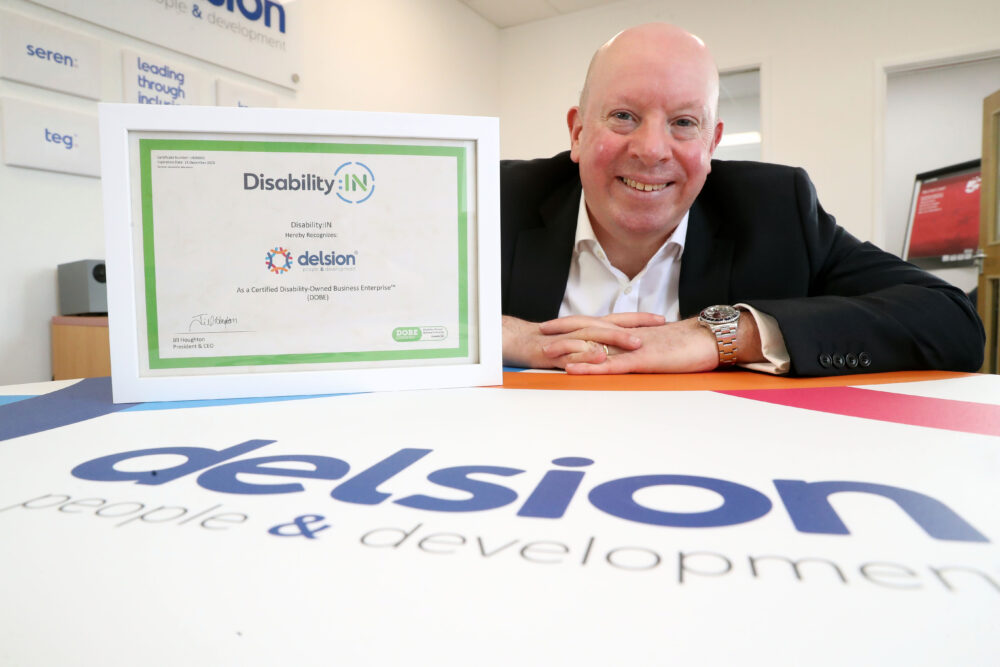The highly sought-after Disability:IN approval holds potential for partnerships with globally recognised brands
A Wales-based business has become the first ever business outside of the US to be accredited as a Disability Owned Business Enterprise (DOBE) by Disability:IN, the global organisation driving disability inclusion and equality in business.
Based in Swansea, Delsion is a multi-award-winning People and Development consultancy that works with businesses to maximise on opportunities to promote diversity, and support inclusion.
It is now also the first organisation outside of America to have gained accreditation as a DOBE through Disability:IN’s third-party Supplier Diversity program, breaking new ground for the Welsh and UK business markets in the process.
As organisations seek to diversify their supply chains and the organisations that they work with, the DOBE accreditation opens up the way for Delsion to work with globally recognised brands.
Disability:IN compiles the prestigious Disability Equality Index, which recognises the accomplishments of nearly 400 international and large-scale businesses dedicated to supporting disability, including through their supply chain.
Corporate partners that participate in Disability:IN’s Supplier Diversity program include Marriott, Microsoft, Sodexo, Walmart and Wells Fargo, among others.
Delsion founder, Julian John, became disabled through brain damage, following a high-level career in Human Resources. His experiences have included having to learn to stand, walk and talk again, long-term unemployment and homelessness.
He set up Delsion to use his knowledge and experiences to support organisations and to focus on the abilities and advantages of having a diverse workforce, rather than the difficulties and barriers.
Julian said of the Disability:IN DOBE accreditation: “I’m really passionate about finding opportunities to support diverse entrepreneurship and enterprise wherever possible, and sought this accreditation to help demonstrate the best practice that is happening at a global level, as well as right here in the UK.
“This accreditation shows how Delsion is able to compete on the world stage through the work that we do to support organisations in becoming more inclusive and promoting diversity generally.”
“It’s also a great opportunity for UK businesses to increase diversity in their own supply chains as a result of Delsion’s breakthrough accreditation, and to learn from the knowledge and insight that will come with it into the British market as a result,” Julian added.
“Our approach to helping organisations become more diverse and inclusive comes from our extensive experience of people and culture change, and importantly from our lived experiences of disability and the very issues and barriers that Diversity & Inclusion activities are aimed at eliminating. Having such a recognised accreditation is a clear sign of how effective this approach is to others considering working with us,” Julian added.
Disability:IN has a network of more than 400 partners working together to expand opportunities for people with disabilities.
Delsion helps people and organisations reach their true potential through the provision of training models, people-oriented solutions and other development programs, created with a view to promoting maximum inclusion at all times.
Its accreditation by Disability:IN as a DOBE available to deliver these services to its corporate partners was subject to an extremely thorough audit process looking at every area of the business, and also involved external ratification of the business by a senior procurement director outside of Disability:IN.
Jill Houghton, President and CEO of Disability:IN, said: “We are proud to expand our DOBE program to the UK as we recognise the global economic impact that self-employment brings to people with disabilities. Delsion is a role model for disability-owned businesses and now has the third-party accreditation needed to bring its people training programs to UK corporations looking for diverse suppliers.”
For more information on Delsion visit www.delsion.co.uk.
For more information on the Disability Owned Business Enterprise program visit www.disabilityin.org
